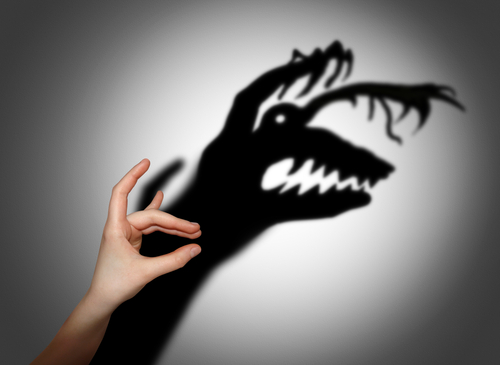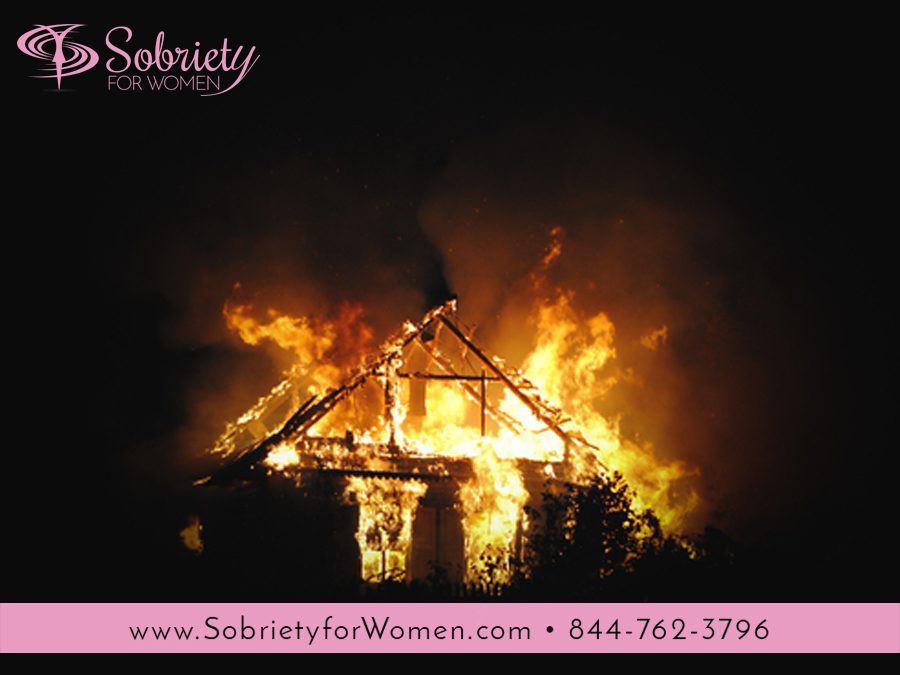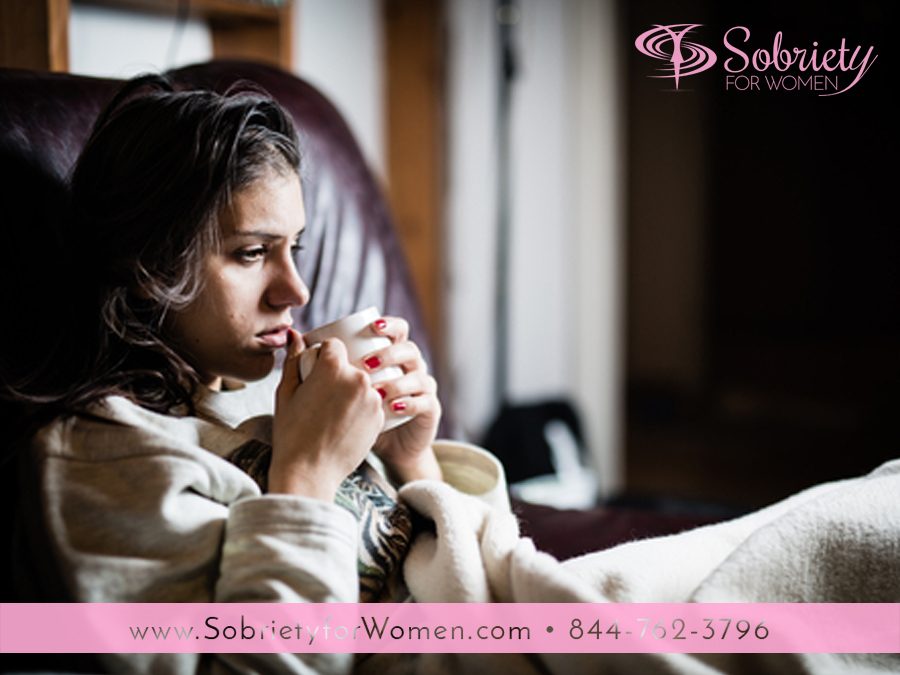
by A Women in Sobriety | Jun 25, 2015 | Addiction Articles, Recovery
Fear Won’t Kill You!
Fear won’t kill you, but it definitely feels like it will! I say this as a woman in long-term recovery who’s faced more than a few “fear situations” in my time.

Look, fear sucks. We’re told in treatment that fear is responsible for a large portion of the stupid actions we took while drinking and drugging. We’re told how corrosive and poisonous fear is, how it can warp even the best intentions.
What we may not be told, though, is how to get through fear. I was told to remember that fear stands for “forgetting everything’s all right,” but that didn’t help me much. I mean, how do we take that and put it into our lives? How can I, a fear based alcoholic, remember that everything’s all right?
With those questions in mind, I put together a guide for walking through fear in early-sobriety (or any other time in sobriety). I hope it helps you all!
Talk to Someone
This is probably the easiest way to get rid of fear (it was for me anyway), so it tops the list. Just talk to someone! It can be your sponsor, a friend, a significant other, someone at work…it can be anyone!
It doesn’t matter who you talk to, simply talking to someone makes the fear so much easier to deal with. If it’s anxiety-based fear, like a lot of mine was, then this cuts the anxiety in half.
Talking to someone could also take the form of getting a therapist. This is a great tool for women, or anyone, in early-sobriety. After all, there’s a lot more going on than simply stopping our drug and alcohol abuse!
Go to a Meeting
This tip connects back to talking to someone. Sometimes the simple act of connecting with other human beings is all we need to kick fear’s butt.
Go to a meeting. Surround yourself with other alcoholics and addicts. Surround yourself with your people! If you can, raise your hand to share. You’ll be amazed how many people come up to you after the meeting and say they know exactly what you shared about.
See, fear is based in isolation. It’s based in thinking we’re different, inferior, or fundamentally wrong. One of the easiest ways to break this type of thinking is to be around people who reassure us we’re not different. We’re the same as them. We’re okay!
Pray

The simple act of praying can help beat the heck out of fear. The way it was explained to me was like this – alcoholics and addicts are fearful people. We’re afraid we won’t get something we want or we’ll lose something we have.
The fear of those two situations causes us all kinds of trouble. It’s also all based in self. Not getting something we want or losing something we have is inherently selfish.
Guess what gets rid of selfishness? Prayer! It connects us to a Higher Power. That power, whatever it is, then allows us to think of other people before ourselves. If we’re no longer being selfish, then the fear of losing something we have or not getting something we want goes away.
Breathing Techniques
Breathing techniques are priceless when it comes to anxiety-based fear. Things like panic attacks and social anxiety can be effectively controlled by simply changing how we breathe.
Fear that’s anxiety based is a physiological response. It’s our fight or flight response. By changing how we take in oxygen, we can calm the body down. We can slow our heart rate and decrease blood pressure.
These, in turn, will make us calmer and help to diminish whatever fear we’re feeling.
Help Someone
This goes back to prayer and the idea that fear is based in selfishness. If we’re not being selfish, then we’re not going to be afraid either! This isn’t always the case, but it is a lot of the time.
So, if you’re scared, nervous, anxious, or feeling any of the other hundred ways fear manifests itself, go help someone! Not only will you be doing something selfless rather than selfish, but you’ll also be connecting with another human being.
That’s like a double whammy of fear beating goodness!
It doesn’t matter how much or how little you help someone out. It could be holding a door open for someone, helping an older person cross the street, or giving someone a ride. The simple fact you’re doing something for someone else is all that matter.
Take a Nap
Let me just say this isn’t the best advice. It’s not a long-term solution and offers no real emotional or mental benefits. Still, it helps in the short-term.
If you’re scared of something, whatever that may be, take a nap! The very act of falling asleep relaxes the body. It’s similar to using breathing techniques to calm down.
Plus, who doesn’t love naps? They’re like my favorite part of the day!

by Fiona Stockard | Jun 4, 2015 | 12 Steps, Addiction Articles
Are Relapse Triggers Real?
My name is [insert generic name here] and I’m an alcoholic. My name is [insert even more generic, but still kind of hip, name here] and I’m an addict.

Those are words we’ve all said countless times. I know I have. I say them each morning when I wake up (just to remind myself of who and what I am), during the go around at meetings, when I raise my hand to share, and when I’m asked to speak. These words are ingrained in my consciousness.
What do they really mean though? Well, through my understanding of alcoholism and addiction, I believe they mean that I’m someone who suffers from a mental obsession, a physical allergy, and a spiritual malady.
Of course there’s a lot more that goes into being an alcoholic (selfishness, unhealthy relationships, etc.), but those three points are at the center of my alcoholism.
But guess what? Two of the three can be treated. Two of the three can be given a daily reprieve. Two of the three can be made better.
This only happens through doing the work (which isn’t really work at all but I can’t think of a better way to phrase it!). Once I admit defeat, get a sponsor, start doing stepwork, get in contact with a God of my own understanding, and start practicing spiritual principles in all my affairs, I also start getting better.
Once I do these simple things, the mental obsession is removed and the spiritual malady is reversed. Of course, they can always come back, but so long as I’m living right…they don’t. It’s that simple.
So, this has all been a long way of making a simple point – I don’t believe that triggers exist. Maybe they do in early-recovery, before we do the work, but once we get spiritual fit, well, we also say goodbye to relapse triggers.
A Bold Claim
I’m not a doctor. I’m not a therapist. I’m not a certified addiction councilor. I don’t have any fancy letters next to my name. I’m just a woman in long-term recovery from drugs and booze.
So, my claim might be a little bold. My assertion that drug relapse triggers don’t exist for spiritually fit individuals might be a little much. I stand by it 100% though.
Want to know why? Because I’m living proof of it. Myself, and millions of other men and women, are walking proof that triggers don’t exist.
Since getting sober, I’ve been around people drinking more times than I can count. You know how many times it’s phased me? How many times it’s made me want a drink myself? Not once.
I’ve been around people smoking pot (a position I don’t like to put myself in, but one that has happened) a handful of times. Did I ever want to take a hit of the joint, a puff on the pipe? Nope.
These things don’t trigger me because, and this goes back to what I mentioned above, I no longer have an alcoholic mind. I’ve recovered from a seemingly hopeless state of mind and body.
Two Things to Remember
Now there are two important, strike that two critical, things to consider – we don’t get better overnight and our spiritual condition is subject to change.
First, we don’t get better overnight. For my first six months of sobriety, I stayed away from all alcohol. If my friends were going to a bar to shoot pool, a concert, or anywhere that served alcohol, I wasn’t there.
I knew I still had an alcoholic mind. I knew I wasn’t strong enough in my recovery to be around alcohol. So I didn’t put myself in those situations. Simple as that.
Second, our spiritual condition is in constant flux. One day we may be super connected and another we may not be connected at all. It’s important to be in touch with where we’re at on any given day.
If you’re spiritually connected, triggers don’t exist. If you’re not, well, triggers can be very real. If you’re not spiritually connected, instead of going to the bar to shoot pool, it’s a good to work with another alcoholic instead.
And that isn’t just my bright idea. It says so in the Big Book and that, as they say, is that!

by Fiona Stockard | Jun 2, 2015 | Addiction Articles, Sobriety For Women
We Didn’t Start the Fire!
Welcome back to Halfway House Chronicles: One Woman’s Story of Early-Sobriety. I hope you liked the first one, ‘cause I have lots more where that came from!

When I was coming up with my list of which interesting experiences to write about, I kept coming back to the idea that they should be more than funny stories. I mean, fun and games are good…but where’s the value? Where’s the spiritual lesson in telling humorous stories about early-recovery?
With that in mind, all Halfway House Chronicles are going to have some sort of lesson attached to them. They’ll have some nugget of wisdom I’ve distilled from my (somewhat crazy) early-sobriety antics.
Today, I’d like to share with you all about the time I lit a fire in my sober living house and end with a reflection on God-centered thinking. Sounds like a jump, right? Then read on!
Okay, Maybe We DID Start the Fire…
I was living in the same halfway house I talked about last time. My roommates who were secretly getting high had been kicked out. I got a new roommate who I loved and, more importantly, who was working to better herself spiritually.
We’d go to meetings together, discuss the Big Book together, do yoga together, meditate together, and talk to boys together. In short, we were inseparable and not always for the best reasons!
One day, we were hanging out on the other side of our halfway house “complex” (the house was actually a bunch of apartments in a large complex). We were smoking cigarettes and talking to two boys who were up on their porch.
They started throwing little bits of gravel at us, so, of course, we threw our cigarettes up at them. Makes sense, right? Oh the strange logic of early-sobriety!
Anyway, one of our cigarettes must have fallen from their porch to the bushes in front of us ‘cause, within a minute or two, we noticed A LOT of smoke coming from the bush. We’d accidently lit it on fire!

this is what the fire looked like in my head!
I started freaking out and yelling about how we were going to get kicked out (I probably should have been yelling about how we could have burned the place down). Thankfully, my roommate was more levelheaded. She ran up into the boys’ apartment, grabbed a bucket of water, and dumped it on the bush.
That got rid of the fire and the immediate emergency. At our house meeting a few days later, my roommate and I got called out for going into the boys’ apartment. Apparently someone had seen my roommate run into their house to get water!
I was furious because a) I hadn’t gone into their apartment and b) my roommate only did it to extinguish the fire! I tried explaining that to the owner and house managers. Of course, they weren’t very understanding. They didn’t kick us out, but we were now on thin ice.
And they were right! One of the house managers, the same one who’d given me such good advice when I called her about my old roommates using, took me aside and gave me some MORE advice I still remember to this day.
A Lesson in Humility & God
Here’s where the lesson I was talking about earlier enters the picture (told you we’d get there!). This woman, who I now think was an angel sent into my life to help me during early-recovery, told me a few things.
First, she pointed out that my roommate and myself wouldn’t have had to get water to extinguish the fire if we hadn’t been at the boys’ apartment in the first place. Okay, that’s pretty obvious right? It hit me like a ton of bricks!
She explained that I was looking for attention and outside validation, which is normal for an alcoholic, when I should have been looking to strengthen my relationship with God.
She sat down with me (ironically right in front of where we’d started the fire!) and explained the difference between God-centered thinking and selfish thinking. God-centered thinking, she said, was when someone prayed and meditated and thought of how they could help people.
Selfish thinking, on the other hand, was what most alcoholics were used to. It was thinking about only ourselves and how to get what we want.
She then explained that although I was upset over this whole situation (and on early-curfew!), I could use it as a source of humility and a way to start practicing God-centered thinking. She told me that us alcoholics don’t learn things easily, that we have to bang out heads on the wall a few times to learn a simple lesson.
I can fortunately say I took her advice. I began to pray and meditate more seriously. I began to practice God-centered thinking AND living. Guess what? I haven’t started a fire since! That, my friends, is a miracle!

by A Women in Sobriety | Mar 24, 2015 | Addiction Articles, Recovery
Post Acute Withdrawal Syndrome
Ah, good old Post Acute Withdrawal Syndrome! Maybe you’ve heard of it. If not by that name, I bet you’ve heard of PAWS. If you’re anything like me, that acronym left you scratching you, wondering why people were talking about animal feet!

Most women in recovery know Post Acute Withdrawal Syndrome all too well. It’s the reason we were a bit off the walls in early-sobriety. Well, okay, one of the reasons!
For those who aren’t familiar with PAWS, sit back and learn the in’s and out’s of post acute withdrawal. Being prepared and knowing how to best mitigate Post Acute Withdrawal Syndrome can be a HUGE help in early-recovery.
After all, anything that gives us a proverbial leg up is welcome. I hope you all enjoy and this helps!
PAWS Symptoms
Post Acute Withdrawal Syndrome symptoms can range from mild to serious. It’s important to remember two things when reading the following list. A) I’m not a doctor, but rather a recovering alcoholic with firsthand experience of PAWS. B) Everyone’s body is different. You may not get all the following symptoms (fingers crossed!).
Find a list of common Post Acute Withdrawal Syndrome symptoms below:
this is when activities which used to be pleasurable no longer are. The best way I can describe it is like a strange form of apathy. I know I should be happy to be at the beach (because, duh, I love the beach), but I’m simply not.
depression as a result of alcoholism or addiction makes sense. I mean, many drugs are depressants and alcohol definitely is! I’m going to make a very unscientific claim here and say that depression is the number one side effect of prolonged drug use.
again, no surprises here. Being sober after using drugs and booze to medicate is scary! So it makes sense that anxiety is a common PAWS symptom. Sometimes post acute withdrawal anxiety is low-level and constant. Other times, it comes in sharp bursts known as panic attacks. Either way, trust me when I say it gets better!
I was convinced that I had ADHD in early-sobriety. It turns out I had no such thing. Prolonged drinking and drugging impact the frontal lobe, the area of our brain that controls concentration, pretty hard. So, it makes sense that I had trouble concentrating.
The frontal lobe also controls judgment, inhibitions, our emotions, and organizational skills. Watch out for trouble in all of those areas during Post Acute Withdrawal Syndrome!
I was basically a huge mess in early-sobriety. While this was largely due to PAWS, it was also due to some of my character defects! One thing that straddled the fence between both was irritability. Watch out for this when you’re counting days. Trust me, it’s better to catch yourself before you say something stupid, than to make amends afterwards!
ah, mood swings! These are probably the most recognizable aspect of PAWS. Your emotions in early-sobriety will often go a little something like this
10:00a.m. – I’m happy! OMG, life is so good!
10:01a.m. – This is so annoying, I can’t even deal right now.
10:02a.m. – No, I just need to chill. Life is really pretty amazing. I can’t believe how blessed I am!
10:03a.m. – I’m so angry! Someone stole my parking spot, don’t they know what I’m going through!
And listen, ladies, if you think I’m poking fun at you, think again. I’ve experienced the above scenario thought for thought…some are sicker than others!
another one of the most common symptoms of post acute withdrawal is disturbed sleep. It’s uncomfortable and, since sleep affects most other areas of our lives, has far reaching implications. It’s for this reason that many doctors recommend taking non-narcotic sleep aides in early-sobriety. Of course, that decision is ultimately up to each woman, her doctor, and a God of her own understanding.
having drug cravings in early-sobriety is perfectly normal. In fact, it might be stranger if someone freshly sober didn’t have the occasional, or quite frequent, craving. Unfortunately, this doesn’t make them any easier to deal with! The good news is that the longer we stay sober, and the more work we do on ourselves, the less intense and frequent cravings become!
Beating PAWS
Now that we know the more common symptoms of post acute withdrawal, let’s figure out how to overcome it! The answer is surprisingly simple – take good care of yourself!
This can mean different things for different people, but there are some general guidelines on how to practice good self-care.

First, eat healthy! Avoid processed food, high fructose corn syrup, and taking in large amounts of refined sugar. Stick to fish, whole grains, fiber rich foods, natural sugars, and fresh vegetables. Although this sounds tough (and expensive!), it’s actually pretty easy. Once you start feeling the benefits (thinks like increased energy, a better/more stable mood, and increased concentration), you’ll want to stick with it.
Second, practice meditation! There’s nothing better to keep you in the moment than practicing staying in the moment! That may sound a bit cliché and corny, but I promise it’s true. Plus, mediation helps alleviate mood swings, irritability, anxiety, and poor concentration.
Next, get plugged in with a support group. Support groups can range from twelve-step fellowships, to “rational recovery” groups, to group therapy, to plain old friends. They’ll do wonders for your overall mental health and cravings. A support group also fosters a sense of belonging that’s vital to long-term recovery.
Finally, do some work on yourself! Although this is one of the harder suggestions to implement, it’s also one of the most beneficial. Working on ourselves is the first positive step many addicts and alcoholics take. It’s the doorway through which we walk to freedom and recovery!










